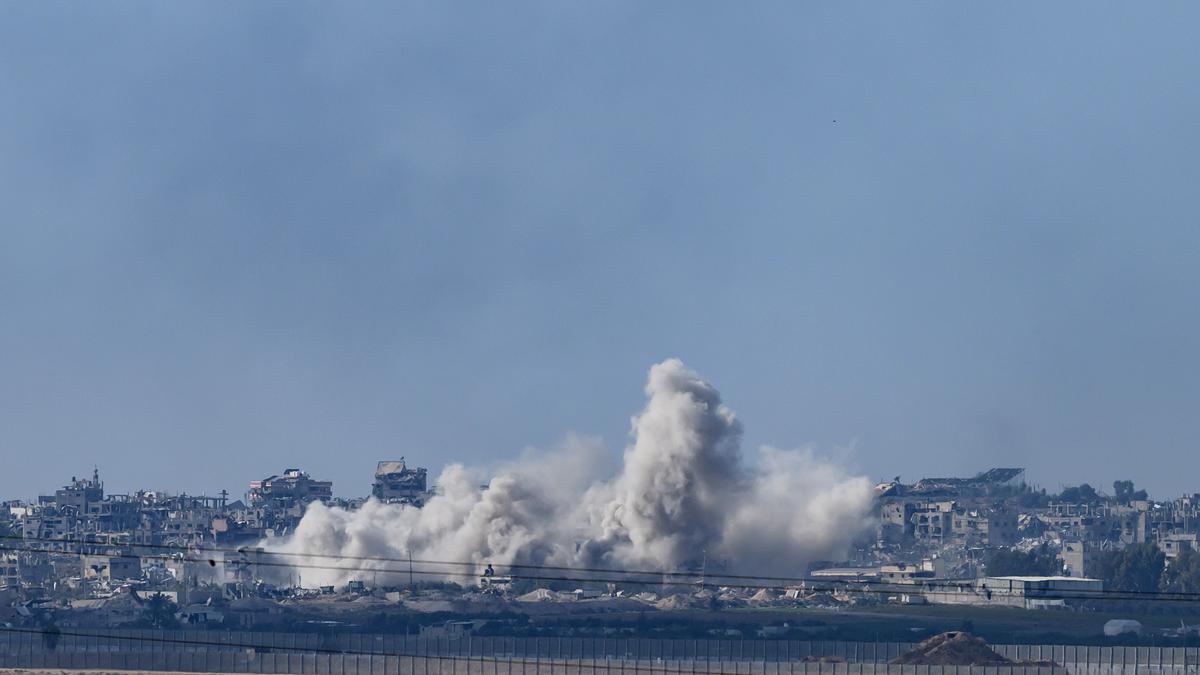
Egypt floats ambitious plan to end Israel-Hamas war and create transitional Palestinian government
The Hindu
Egypt has put forward an ambitious, initial proposal to end the Israel-Hamas war with a ceasefire, a phased hostage release and the creation of a Palestinian government of experts
Egypt has put forward an ambitious, initial proposal to end the Israel-Hamas war with a ceasefire, a phased hostage release and the creation of a Palestinian government of experts who would administer the Gaza Strip and occupied West Bank, a senior Egyptian official and a European diplomat said on December 25.
The proposal, worked out with the Gulf nation of Qatar, has been presented to Israel, Hamas, the U.S. and European governments but still appeared preliminary. It falls short of Israel’s professed goal of outright crushing Hamas and would appear not to meet Israel’s insistence on keeping military control over Gaza for an extended period after the war.
Israel’s War Cabinet, including Prime Minister Benjamin Netanyahu, will meet later on Monday to discuss the hostage situation, among other topics, an Israeli official said, but would not say if they would discuss the Egyptian proposal. The official spoke on condition of anonymity because they were not authorized to talk to the media.
Word of the proposal comes after three bloody days across Gaza before Christmas Day in which Israeli airstrikes killed dozens of Palestinians at a time and 17 troops were killed in ground fighting in the north, center and south of the territory.
The war has devastated large parts of Gaza, killed more than 20,400 Palestinians and displaced almost all of the territory’s 2.3 million people.
The mounting death toll among Israeli troops — 156 since the ground offensive began — could erode public support for the war, which was sparked when Hamas-led militants stormed communities in southern Israel on Oct. 7, killing 1,200 and taking 240 hostage.
Israelis still largely stand behind the country’s stated goals of crushing Hamas’ governing and military capabilities and releasing the remaining 129 captives. That’s despite rising international pressure against Israel’s offensive, and the soaring death toll and unprecedented suffering among Palestinians.

“Writing, in general, is a very solitary process,” says Yauvanika Chopra, Associate Director at The New India Foundation (NIF), which, earlier this year, announced the 12th edition of its NIF Book Fellowships for research and scholarship about Indian history after Independence. While authors, in general, are built for it, it can still get very lonely, says Chopra, pointing out that the fellowship’s community support is as valuable as the monetary benefits it offers. “There is a solid community of NIF fellows, trustees, language experts, jury members, all of whom are incredibly competent,” she says. “They really help make authors feel supported from manuscript to publication, so you never feel like you’re struggling through isolation.”

Several principals of government and private schools in Delhi on Tuesday said the Directorate of Education (DoE) circular from a day earlier, directing schools to conduct classes in ‘hybrid’ mode, had caused confusion regarding day-to-day operations as they did not know how many students would return to school from Wednesday and how would teachers instruct in two modes — online and in person — at once. The DoE circular on Monday had also stated that the option to “exercise online mode of education, wherever available, shall vest with the students and their guardians”. Several schoolteachers also expressed confusion regarding the DoE order. A government schoolteacher said he was unsure of how to cope with the resumption of physical classes, given that the order directing government offices to ensure that 50% of the employees work from home is still in place. On Monday, the Commission for Air Quality Management in the National Capital Region and Adjoining Areas (CAQM) had, on the orders of the Supreme Court, directed schools in Delhi-NCR to shift classes to the hybrid mode, following which the DoE had issued the circular. The court had urged the Centre’s pollution watchdog to consider restarting physical classes due to many students missing out on the mid-day meals and lacking the necessary means to attend classes online. The CAQM had, on November 20, asked schools in Delhi-NCR to shift to the online mode of teaching.









